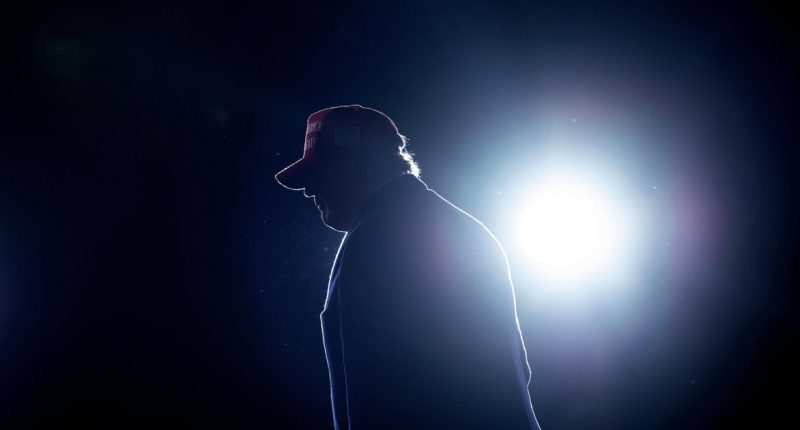
The FBI said this week it had no information indicating a credible terrorist threat against the United States, but social media pundits who have been raising the alarm for days aren’t backing down.
Conservative social media influencers have been filling platforms such as X and Truth Social with speculation not backed by any evidence that attacks on civilians in Israel would soon be followed by similar attacks in major U.S. cities and that people should begin preparing — including by avoiding cities and purchasing firearms.
The speculation with no evidence to support it has come from former President Donald Trump, his son Donald Trump Jr. and a host of right-wing commentators with big followings who issued vague warnings about imminent invasions or attacks. Many of the posts tie in a hodgepodge of Republican Party talking points on subjects such as gun rights, immigration from Asia, crime and Iran policy.
The posts show how quickly the latest bloody conflict between Israel and Hamas has upended online political debate thousands of miles away, and how it’s being used by political figures to push certain agendas and issues.
Trump, from his account on Truth Social, raised the idea of a potential threat by focusing on the unfounded claim that Hamas was coming in to the U.S. through the southern border.
“The same people that raided Israel are pouring into our once beautiful USA, through our TOTALLY OPEN SOUTHERN BORDER, at Record Numbers. Are they planning an attack within our Country?” he asked in a post Monday. The post had 30,700 “likes” as of Wednesday, according to the app.
Trump’s post-presidency office did not immediately respond to a request for more information on his post.
NBC News reported last month that U.S. border agents have taken into custody a growing number of people on the FBI’s terrorist watchlist trying to enter via the southern border, but there is no evidence that Hamas fighters who carried out attacks in Israel in recent days are pouring in from Mexico.
The theory that terrorists will sneak across the U.S.-Mexico border to attack Americans has been a recurring theme in conservative media and politics for more than 20 years, even though the perpetrators of the biggest terrorist attacks in the U.S. over that time — such as the 2009 Fort Hood shooting, the 2013 Boston Marathon bombing and the 2019 El Paso shooting — had had no connection to the southern border.
But some warnings this week weren’t even specific to the border. Trump Jr. turned the subject to gun rights, warning readers to be prepared.
“If anyone is still stupid enough to not understand why we have the 2nd amendment, have them watch any one of the hundreds of videos coming from Israel,” he wrote in a post on X on Sunday. The post got 7.8 million views, according to the view tally on X.
He followed up the next day with another post: “If you don’t yet own an AR-15 you really need to think that through right about now.” That one got 4.8 million views.
Trump Jr. did not immediately respond to a request for comment emailed to the Trump Organization, where he is executive vice president.
Laura Loomer, a far-right provocateur who’s been banned from most social media platforms including Facebook and Instagram, issued her own dire prediction on X.
“Stay out of major cities. There’s going to be massive terrorist attacks in big cities over these next 14 months,” she wrote, adding a warning about a “global Islamic caliphate.” Her post got 5.1 million views on the app owned by tech billionaire Elon Musk. Loomer did not immediately respond to a request for comment.
Other social media accounts warned without evidence of Hamas “sleeper cells” — invoking a term that spiked in popularity after the Sept. 11, 2001, terrorist attacks.
“The sleeper cells in America wont be sleeping much longer… Stay out of the cities,” warned a post from the X account @GuntherEagleman. It got 452,000 views.
Reached by phone, a man who said he runs the @GuntherEagleman account, said he stood by his warning given the apprehensions at the border of people on the U.S. terrorist watchlist.
“All it takes is one bad person,” he said. He said Gunther Eagleman is a pseudonym, and he spoke on condition of anonymity because he said he has received threatening messages on social media.
There were 216 people on the terrorist watchlist who were stopped at the southern border as of July this fiscal year, though experts have called such figures misleading because authorities presumably did not let those people go after stopping them.
The FBI said Monday that there was no clear threat and that it would remain vigilant against the possibility of one.
“While the FBI does not have specific and credible intelligence indicating a threat to the United States stemming from the Hamas attacks in Israel, we are closely monitoring unfolding events and will share relevant information with our state, local, federal and international law enforcement, intelligence and homeland security partners to ensure they are prepared for any impacts to public safety,” the FBI said in a statement.
“We will not hesitate to adjust our security posture, as appropriate, to protect the American people,” the agency said.
The FBI’s New York office reiterated Tuesday that it had no “specific and credible intelligence indicating a threat to our city.” Its post on X got lower visibility than the alarmist posts from others, racking up only 231,000 views.
But many of the replies to that post were skeptical, alleging that the U.S. border was “open” and that the FBI should investigate pro-Palestinian demonstrators in New York.
The X account @zerohedge, which usually shares a mix of financial news and conservative opinion with 1.7 million followers, darkly joked that the FBI was dedicating only 10% of its attention to Hamas threats but 90% to “MAGA terrorists.” That post got 285,000 views.
Experts said many of the posts appeared to be unhelpful fear-mongering designed for maximum virality.
Even if they’re vague or baseless, the threat warnings often get views because social media apps are biased in favor of emotional appeals to fear and outrage, said William Brady, an assistant professor at Northwestern University’s Kellogg School of Management and co-author of a 2020 paper on how emotion spreads online.
“This type of content does draw a lot of engagement and has a high chance of going viral,” he said.
“We’re all trying to make sense of some uncertainty, and certain political actors are going to try to leverage that to try something like fear-mongering,” Brady said.
It’s human nature to seek out information about additional threats in the days after an attack like the ones in Israel, so that people can avoid risk and reduce their anxiety, said Shana Gadarian, a professor of political science at Syracuse University, who has studied the relationship between terrorism and public opinion.
But many of the social media posts circulating this week aren’t helpful, she said, because they don’t include a specific solution.
“There’s no real solution there but to sit in your house and watch Fox News or watch whatever platform they’re asking you to tune in to,” Gadarian said.
Source: | This article originally belongs to Nbcnews.com









